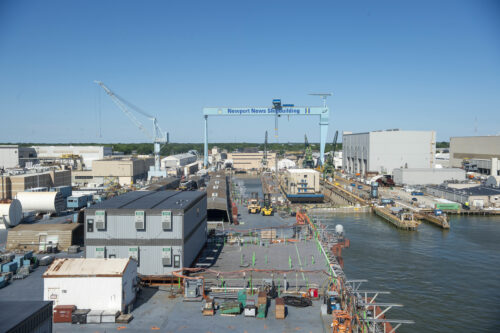A Chinese graduate student studying at the University of Minnesota is facing unusual Espionage Act charges related to drone photography near a critical U.S. shipyard in Virginia.

Shi Fengyun, currently restricted to Virginia while awaiting trial, is accused of violating two rarely-used provisions of the Espionage Act. These statutes prohibit photographing vital military installations and using aircraft (in this case, a drone) to do so. While the case is ongoing and details remain unclear, it raises significant questions concerning national security and First Amendment protections, according to Wired.
Court documents allege that in January 2024, Shi, on leave from his studies, traveled to Virginia and rented a car. He allegedly flew a drone in bad weather near the Newport News Shipyard, a facility actively manufacturing nuclear submarines and the latest generation of U.S. Navy aircraft carriers. When the drone became lodged in a tree, Shi reportedly approached a neighbor for help. The neighbor, suspicious of Shi’s nationality and purpose, contacted authorities who questioned him. Shi then abandoned the scene, leaving the drone behind. Examination of the drone’s memory card revealed images of the shipyard and BAE Systems, a defense contractor.
The Department of Justice (DOJ) is declining comment on the case, including whether they suspect Shi of acting on behalf of the Chinese government. Satellites routinely capture similar imagery, making the rationale behind pursuing a case against Shi unclear. Some speculate that Shi’s nationality may have influenced the DOJ’s decision, though no charges related to espionage have been filed.
Legal experts warn that prosecuting cases under these statutes can have unintended consequences, potentially chilling First Amendment rights. Photographing in public spaces is generally protected by the Constitution. Experts argue that the case could serve as a valuable opportunity to clarify the legal boundaries surrounding photography of sensitive military installations. Previous cases involving these statutes have resulted in settlements favoring individuals who were questioned or detained for photographing military facilities.
Shi’s case, scheduled to begin on June 20th, may end in a plea agreement. While his lawyer has not responded to requests for comment, details from Shi’s social media profiles depict an ordinary life focused on academics, video games, and soccer. A former colleague describes him as a passionate researcher facing personal struggles. Whether Shi intentionally violated the Espionage Act or simply exercised poor judgment remains to be seen. This case is certain to be closely watched as it navigates the complex intersection of national security concerns and individual liberties.
This incident is not the first time a Chinese citizen has captured sensitive imagery of U.S. military assets.
In April and May of 2024, social media account “@Xiao_Hao_4” posted photos and videos, apparently taken from a drone, of the USS Ronald Reagan aircraft carrier and other US Navy warships stationed at Yokosuka Naval Base in Japan. While the U.S. Navy investigated the authenticity of the footage, they found no evidence of a drone overflight. Japan, however, took the incident seriously, considering it a “high possibility” that the drone footage was genuine. Japanese officials expressed concern about the potential security risks posed by unauthorized drone use and pledged to implement new countermeasure equipment.
The recent events in Japan highlight the growing challenge of securing military installations in the age of readily available drone technology. The Shi case, alongside the incident at Yokosuka Naval Base, underscores the complex interplay between national security concerns, individual privacy rights, and the evolving technological landscape.
For more information, hit the Source below